Organisational Behaviour Report: Unilever, OB Theories, Analysis
VerifiedAdded on 2023/01/18
|16
|5275
|72
Report
AI Summary
This report examines organizational behaviour within Unilever, a British transnational consumer goods company. It begins by exploring how organizational culture, politics, and power influence individual and team behaviour and performance, applying Handy's culture model and French and Raven's theory of power. The report then investigates how content and process theories of motivation enable effective goal achievement within the organization, referencing Maslow's hierarchy of needs. Furthermore, it delves into the characteristics of effective and ineffective teams, utilizing Tuckerman and Belbin's theories. Finally, the report assesses the application of organizational behaviour concepts and philosophies within Unilever, evaluating their impact on business performance and concluding with a critical analysis of the relevance of team development theories, concepts, and philosophies in improving overall business outcomes.
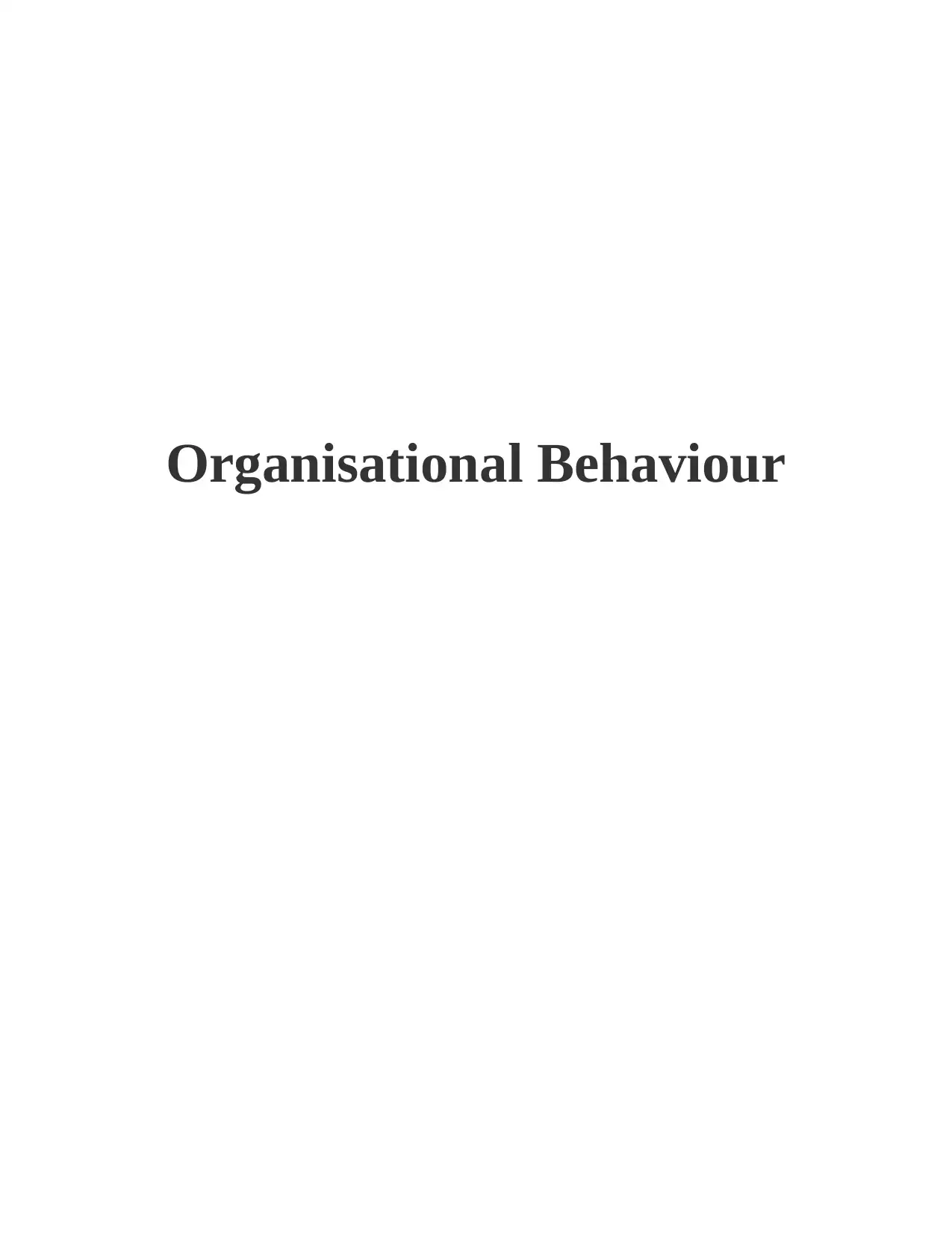
Organisational Behaviour
Paraphrase This Document
Need a fresh take? Get an instant paraphrase of this document with our AI Paraphraser
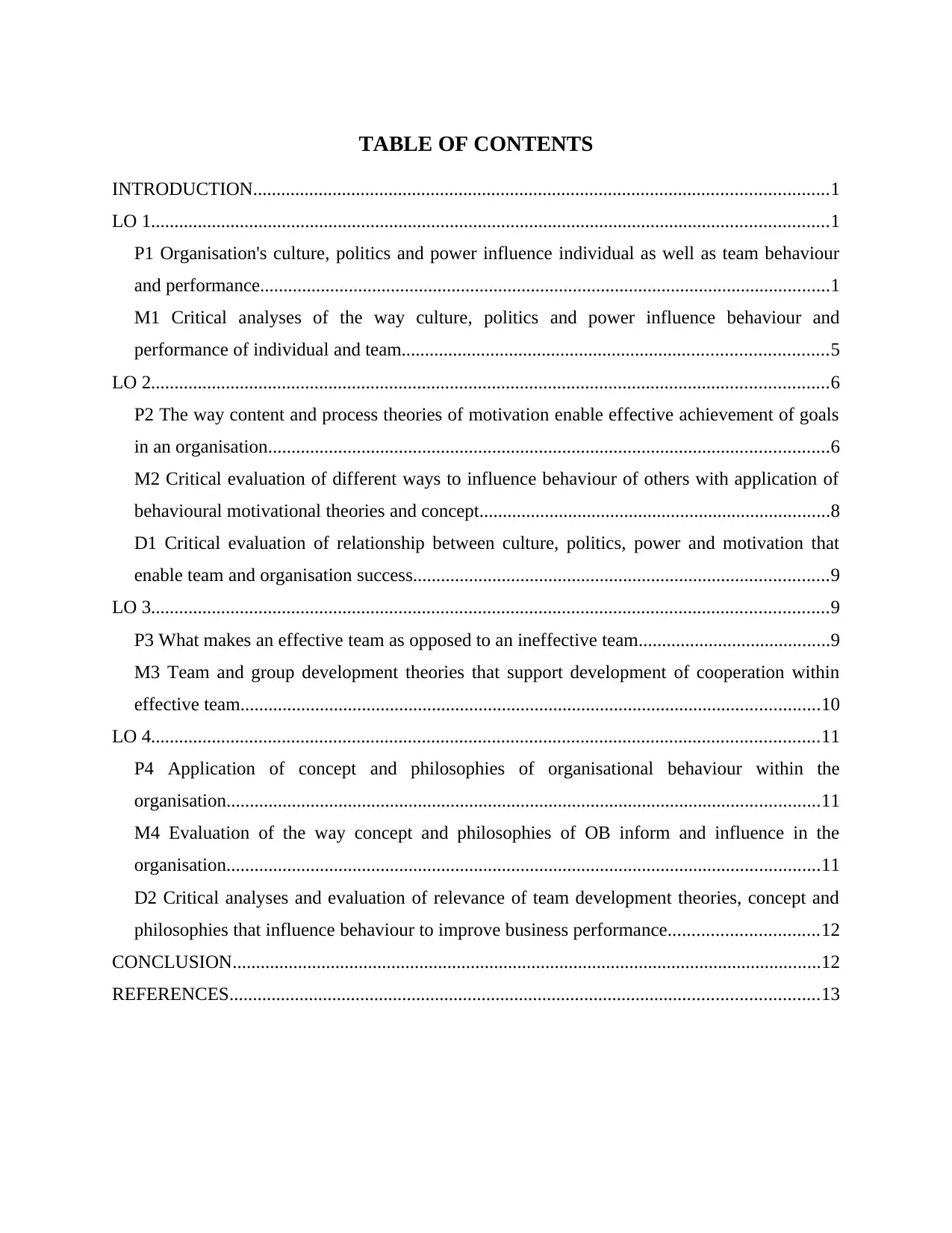
TABLE OF CONTENTS
INTRODUCTION...........................................................................................................................1
LO 1.................................................................................................................................................1
P1 Organisation's culture, politics and power influence individual as well as team behaviour
and performance..........................................................................................................................1
M1 Critical analyses of the way culture, politics and power influence behaviour and
performance of individual and team...........................................................................................5
LO 2.................................................................................................................................................6
P2 The way content and process theories of motivation enable effective achievement of goals
in an organisation........................................................................................................................6
M2 Critical evaluation of different ways to influence behaviour of others with application of
behavioural motivational theories and concept...........................................................................8
D1 Critical evaluation of relationship between culture, politics, power and motivation that
enable team and organisation success.........................................................................................9
LO 3.................................................................................................................................................9
P3 What makes an effective team as opposed to an ineffective team.........................................9
M3 Team and group development theories that support development of cooperation within
effective team............................................................................................................................10
LO 4...............................................................................................................................................11
P4 Application of concept and philosophies of organisational behaviour within the
organisation...............................................................................................................................11
M4 Evaluation of the way concept and philosophies of OB inform and influence in the
organisation...............................................................................................................................11
D2 Critical analyses and evaluation of relevance of team development theories, concept and
philosophies that influence behaviour to improve business performance................................12
CONCLUSION..............................................................................................................................12
REFERENCES..............................................................................................................................13
INTRODUCTION...........................................................................................................................1
LO 1.................................................................................................................................................1
P1 Organisation's culture, politics and power influence individual as well as team behaviour
and performance..........................................................................................................................1
M1 Critical analyses of the way culture, politics and power influence behaviour and
performance of individual and team...........................................................................................5
LO 2.................................................................................................................................................6
P2 The way content and process theories of motivation enable effective achievement of goals
in an organisation........................................................................................................................6
M2 Critical evaluation of different ways to influence behaviour of others with application of
behavioural motivational theories and concept...........................................................................8
D1 Critical evaluation of relationship between culture, politics, power and motivation that
enable team and organisation success.........................................................................................9
LO 3.................................................................................................................................................9
P3 What makes an effective team as opposed to an ineffective team.........................................9
M3 Team and group development theories that support development of cooperation within
effective team............................................................................................................................10
LO 4...............................................................................................................................................11
P4 Application of concept and philosophies of organisational behaviour within the
organisation...............................................................................................................................11
M4 Evaluation of the way concept and philosophies of OB inform and influence in the
organisation...............................................................................................................................11
D2 Critical analyses and evaluation of relevance of team development theories, concept and
philosophies that influence behaviour to improve business performance................................12
CONCLUSION..............................................................................................................................12
REFERENCES..............................................................................................................................13
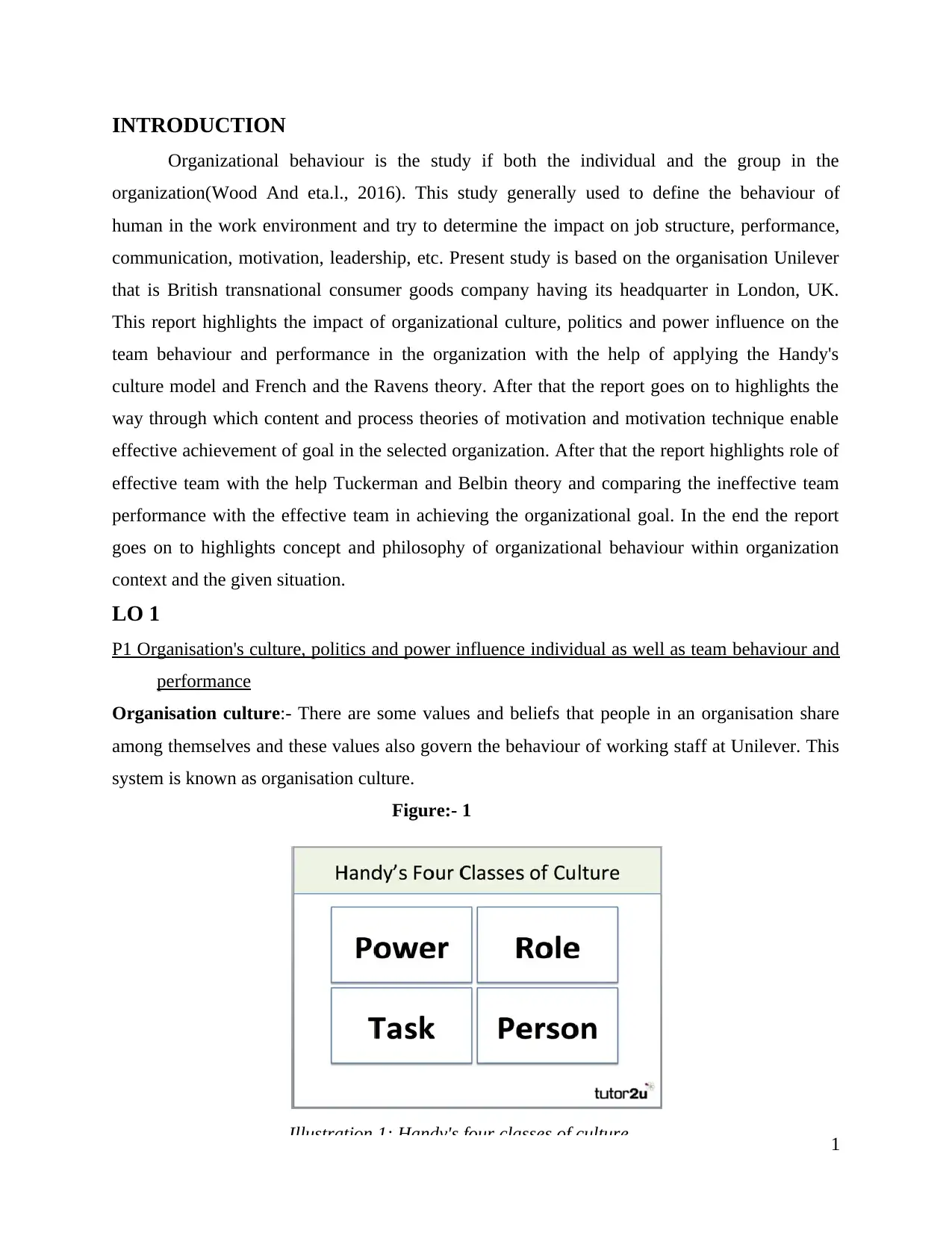
INTRODUCTION
Organizational behaviour is the study if both the individual and the group in the
organization(Wood And eta.l., 2016). This study generally used to define the behaviour of
human in the work environment and try to determine the impact on job structure, performance,
communication, motivation, leadership, etc. Present study is based on the organisation Unilever
that is British transnational consumer goods company having its headquarter in London, UK.
This report highlights the impact of organizational culture, politics and power influence on the
team behaviour and performance in the organization with the help of applying the Handy's
culture model and French and the Ravens theory. After that the report goes on to highlights the
way through which content and process theories of motivation and motivation technique enable
effective achievement of goal in the selected organization. After that the report highlights role of
effective team with the help Tuckerman and Belbin theory and comparing the ineffective team
performance with the effective team in achieving the organizational goal. In the end the report
goes on to highlights concept and philosophy of organizational behaviour within organization
context and the given situation.
LO 1
P1 Organisation's culture, politics and power influence individual as well as team behaviour and
performance
Organisation culture:- There are some values and beliefs that people in an organisation share
among themselves and these values also govern the behaviour of working staff at Unilever. This
system is known as organisation culture.
Figure:- 1
1
Illustration 1: Handy's four classes of culture
Organizational behaviour is the study if both the individual and the group in the
organization(Wood And eta.l., 2016). This study generally used to define the behaviour of
human in the work environment and try to determine the impact on job structure, performance,
communication, motivation, leadership, etc. Present study is based on the organisation Unilever
that is British transnational consumer goods company having its headquarter in London, UK.
This report highlights the impact of organizational culture, politics and power influence on the
team behaviour and performance in the organization with the help of applying the Handy's
culture model and French and the Ravens theory. After that the report goes on to highlights the
way through which content and process theories of motivation and motivation technique enable
effective achievement of goal in the selected organization. After that the report highlights role of
effective team with the help Tuckerman and Belbin theory and comparing the ineffective team
performance with the effective team in achieving the organizational goal. In the end the report
goes on to highlights concept and philosophy of organizational behaviour within organization
context and the given situation.
LO 1
P1 Organisation's culture, politics and power influence individual as well as team behaviour and
performance
Organisation culture:- There are some values and beliefs that people in an organisation share
among themselves and these values also govern the behaviour of working staff at Unilever. This
system is known as organisation culture.
Figure:- 1
1
Illustration 1: Handy's four classes of culture
⊘ This is a preview!⊘
Do you want full access?
Subscribe today to unlock all pages.

Trusted by 1+ million students worldwide
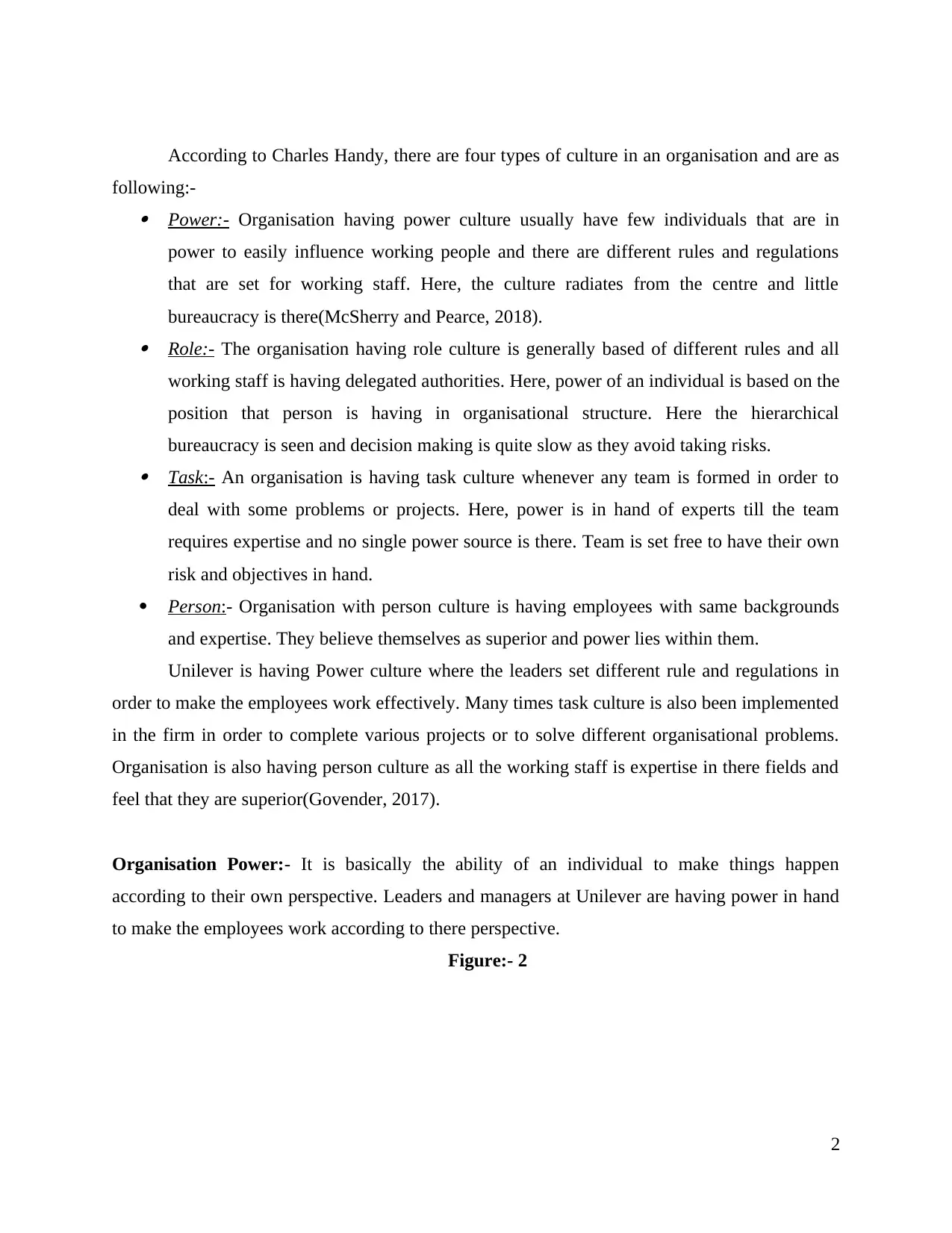
According to Charles Handy, there are four types of culture in an organisation and are as
following:- Power:- Organisation having power culture usually have few individuals that are in
power to easily influence working people and there are different rules and regulations
that are set for working staff. Here, the culture radiates from the centre and little
bureaucracy is there(McSherry and Pearce, 2018). Role:- The organisation having role culture is generally based of different rules and all
working staff is having delegated authorities. Here, power of an individual is based on the
position that person is having in organisational structure. Here the hierarchical
bureaucracy is seen and decision making is quite slow as they avoid taking risks. Task:- An organisation is having task culture whenever any team is formed in order to
deal with some problems or projects. Here, power is in hand of experts till the team
requires expertise and no single power source is there. Team is set free to have their own
risk and objectives in hand.
Person:- Organisation with person culture is having employees with same backgrounds
and expertise. They believe themselves as superior and power lies within them.
Unilever is having Power culture where the leaders set different rule and regulations in
order to make the employees work effectively. Many times task culture is also been implemented
in the firm in order to complete various projects or to solve different organisational problems.
Organisation is also having person culture as all the working staff is expertise in there fields and
feel that they are superior(Govender, 2017).
Organisation Power:- It is basically the ability of an individual to make things happen
according to their own perspective. Leaders and managers at Unilever are having power in hand
to make the employees work according to there perspective.
Figure:- 2
2
following:- Power:- Organisation having power culture usually have few individuals that are in
power to easily influence working people and there are different rules and regulations
that are set for working staff. Here, the culture radiates from the centre and little
bureaucracy is there(McSherry and Pearce, 2018). Role:- The organisation having role culture is generally based of different rules and all
working staff is having delegated authorities. Here, power of an individual is based on the
position that person is having in organisational structure. Here the hierarchical
bureaucracy is seen and decision making is quite slow as they avoid taking risks. Task:- An organisation is having task culture whenever any team is formed in order to
deal with some problems or projects. Here, power is in hand of experts till the team
requires expertise and no single power source is there. Team is set free to have their own
risk and objectives in hand.
Person:- Organisation with person culture is having employees with same backgrounds
and expertise. They believe themselves as superior and power lies within them.
Unilever is having Power culture where the leaders set different rule and regulations in
order to make the employees work effectively. Many times task culture is also been implemented
in the firm in order to complete various projects or to solve different organisational problems.
Organisation is also having person culture as all the working staff is expertise in there fields and
feel that they are superior(Govender, 2017).
Organisation Power:- It is basically the ability of an individual to make things happen
according to their own perspective. Leaders and managers at Unilever are having power in hand
to make the employees work according to there perspective.
Figure:- 2
2
Paraphrase This Document
Need a fresh take? Get an instant paraphrase of this document with our AI Paraphraser
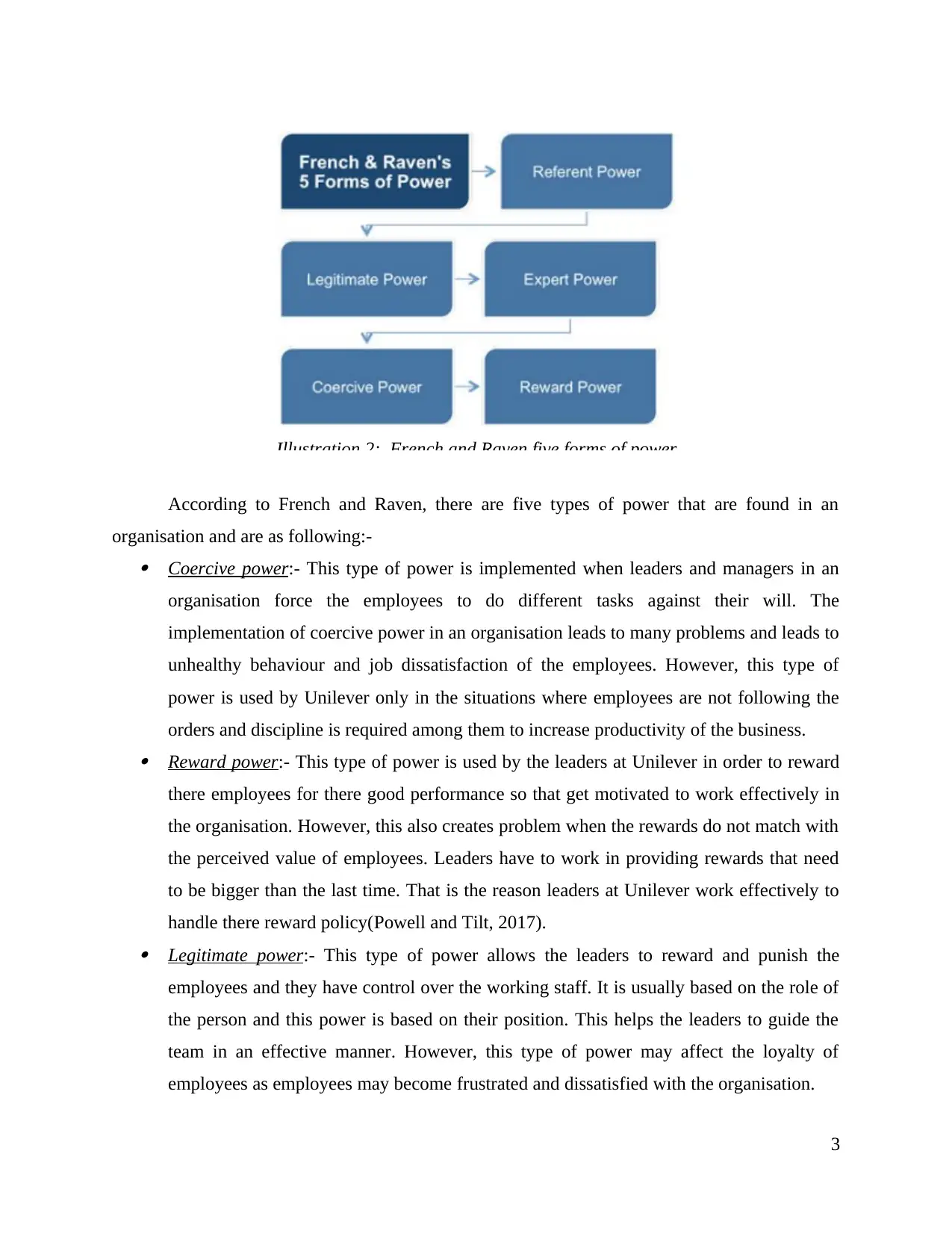
According to French and Raven, there are five types of power that are found in an
organisation and are as following:- Coercive power:- This type of power is implemented when leaders and managers in an
organisation force the employees to do different tasks against their will. The
implementation of coercive power in an organisation leads to many problems and leads to
unhealthy behaviour and job dissatisfaction of the employees. However, this type of
power is used by Unilever only in the situations where employees are not following the
orders and discipline is required among them to increase productivity of the business. Reward power:- This type of power is used by the leaders at Unilever in order to reward
there employees for there good performance so that get motivated to work effectively in
the organisation. However, this also creates problem when the rewards do not match with
the perceived value of employees. Leaders have to work in providing rewards that need
to be bigger than the last time. That is the reason leaders at Unilever work effectively to
handle there reward policy(Powell and Tilt, 2017). Legitimate power:- This type of power allows the leaders to reward and punish the
employees and they have control over the working staff. It is usually based on the role of
the person and this power is based on their position. This helps the leaders to guide the
team in an effective manner. However, this type of power may affect the loyalty of
employees as employees may become frustrated and dissatisfied with the organisation.
3
Illustration 2: French and Raven five forms of power
organisation and are as following:- Coercive power:- This type of power is implemented when leaders and managers in an
organisation force the employees to do different tasks against their will. The
implementation of coercive power in an organisation leads to many problems and leads to
unhealthy behaviour and job dissatisfaction of the employees. However, this type of
power is used by Unilever only in the situations where employees are not following the
orders and discipline is required among them to increase productivity of the business. Reward power:- This type of power is used by the leaders at Unilever in order to reward
there employees for there good performance so that get motivated to work effectively in
the organisation. However, this also creates problem when the rewards do not match with
the perceived value of employees. Leaders have to work in providing rewards that need
to be bigger than the last time. That is the reason leaders at Unilever work effectively to
handle there reward policy(Powell and Tilt, 2017). Legitimate power:- This type of power allows the leaders to reward and punish the
employees and they have control over the working staff. It is usually based on the role of
the person and this power is based on their position. This helps the leaders to guide the
team in an effective manner. However, this type of power may affect the loyalty of
employees as employees may become frustrated and dissatisfied with the organisation.
3
Illustration 2: French and Raven five forms of power
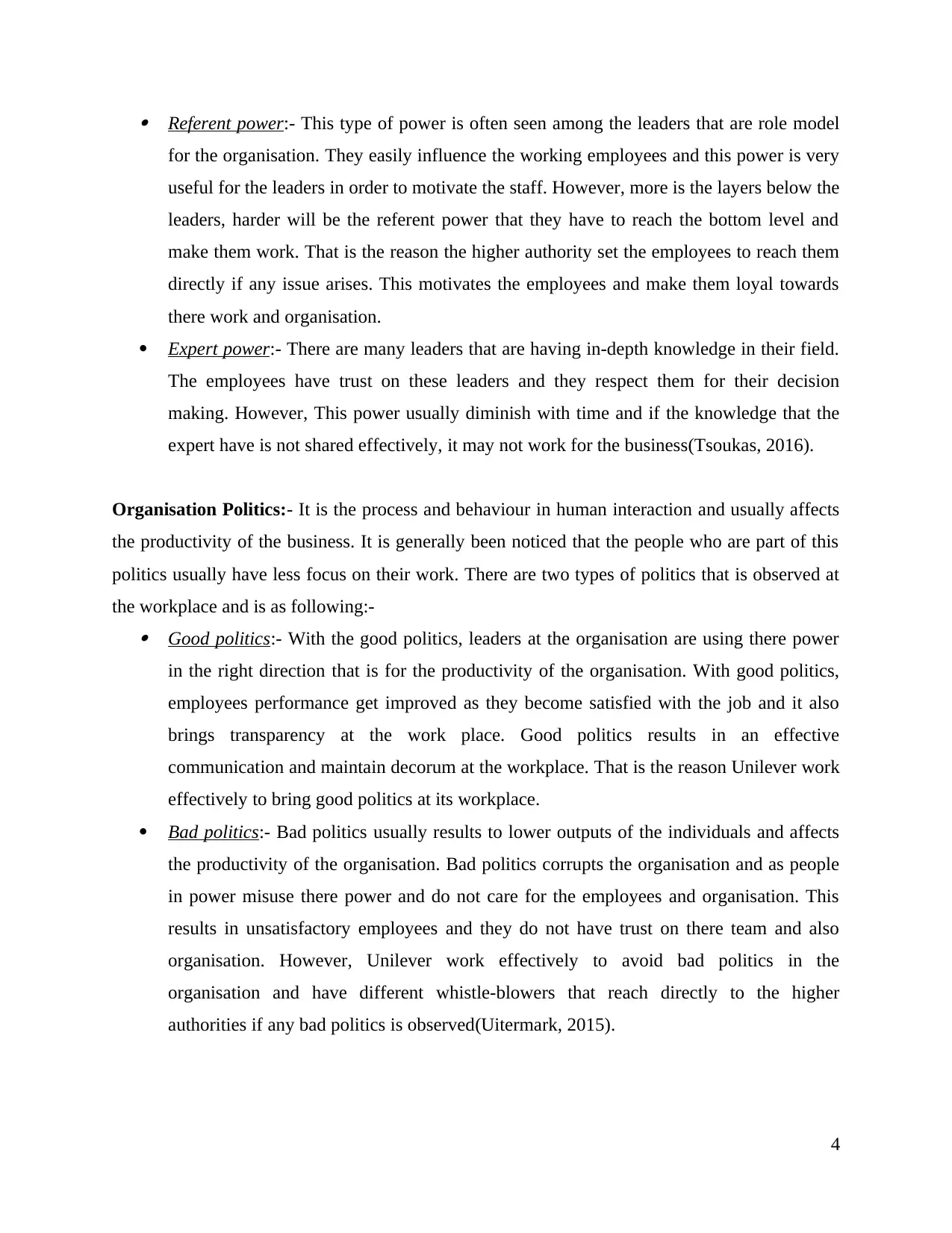
Referent power:- This type of power is often seen among the leaders that are role model
for the organisation. They easily influence the working employees and this power is very
useful for the leaders in order to motivate the staff. However, more is the layers below the
leaders, harder will be the referent power that they have to reach the bottom level and
make them work. That is the reason the higher authority set the employees to reach them
directly if any issue arises. This motivates the employees and make them loyal towards
there work and organisation.
Expert power:- There are many leaders that are having in-depth knowledge in their field.
The employees have trust on these leaders and they respect them for their decision
making. However, This power usually diminish with time and if the knowledge that the
expert have is not shared effectively, it may not work for the business(Tsoukas, 2016).
Organisation Politics:- It is the process and behaviour in human interaction and usually affects
the productivity of the business. It is generally been noticed that the people who are part of this
politics usually have less focus on their work. There are two types of politics that is observed at
the workplace and is as following:- Good politics:- With the good politics, leaders at the organisation are using there power
in the right direction that is for the productivity of the organisation. With good politics,
employees performance get improved as they become satisfied with the job and it also
brings transparency at the work place. Good politics results in an effective
communication and maintain decorum at the workplace. That is the reason Unilever work
effectively to bring good politics at its workplace.
Bad politics:- Bad politics usually results to lower outputs of the individuals and affects
the productivity of the organisation. Bad politics corrupts the organisation and as people
in power misuse there power and do not care for the employees and organisation. This
results in unsatisfactory employees and they do not have trust on there team and also
organisation. However, Unilever work effectively to avoid bad politics in the
organisation and have different whistle-blowers that reach directly to the higher
authorities if any bad politics is observed(Uitermark, 2015).
4
for the organisation. They easily influence the working employees and this power is very
useful for the leaders in order to motivate the staff. However, more is the layers below the
leaders, harder will be the referent power that they have to reach the bottom level and
make them work. That is the reason the higher authority set the employees to reach them
directly if any issue arises. This motivates the employees and make them loyal towards
there work and organisation.
Expert power:- There are many leaders that are having in-depth knowledge in their field.
The employees have trust on these leaders and they respect them for their decision
making. However, This power usually diminish with time and if the knowledge that the
expert have is not shared effectively, it may not work for the business(Tsoukas, 2016).
Organisation Politics:- It is the process and behaviour in human interaction and usually affects
the productivity of the business. It is generally been noticed that the people who are part of this
politics usually have less focus on their work. There are two types of politics that is observed at
the workplace and is as following:- Good politics:- With the good politics, leaders at the organisation are using there power
in the right direction that is for the productivity of the organisation. With good politics,
employees performance get improved as they become satisfied with the job and it also
brings transparency at the work place. Good politics results in an effective
communication and maintain decorum at the workplace. That is the reason Unilever work
effectively to bring good politics at its workplace.
Bad politics:- Bad politics usually results to lower outputs of the individuals and affects
the productivity of the organisation. Bad politics corrupts the organisation and as people
in power misuse there power and do not care for the employees and organisation. This
results in unsatisfactory employees and they do not have trust on there team and also
organisation. However, Unilever work effectively to avoid bad politics in the
organisation and have different whistle-blowers that reach directly to the higher
authorities if any bad politics is observed(Uitermark, 2015).
4
⊘ This is a preview!⊘
Do you want full access?
Subscribe today to unlock all pages.

Trusted by 1+ million students worldwide
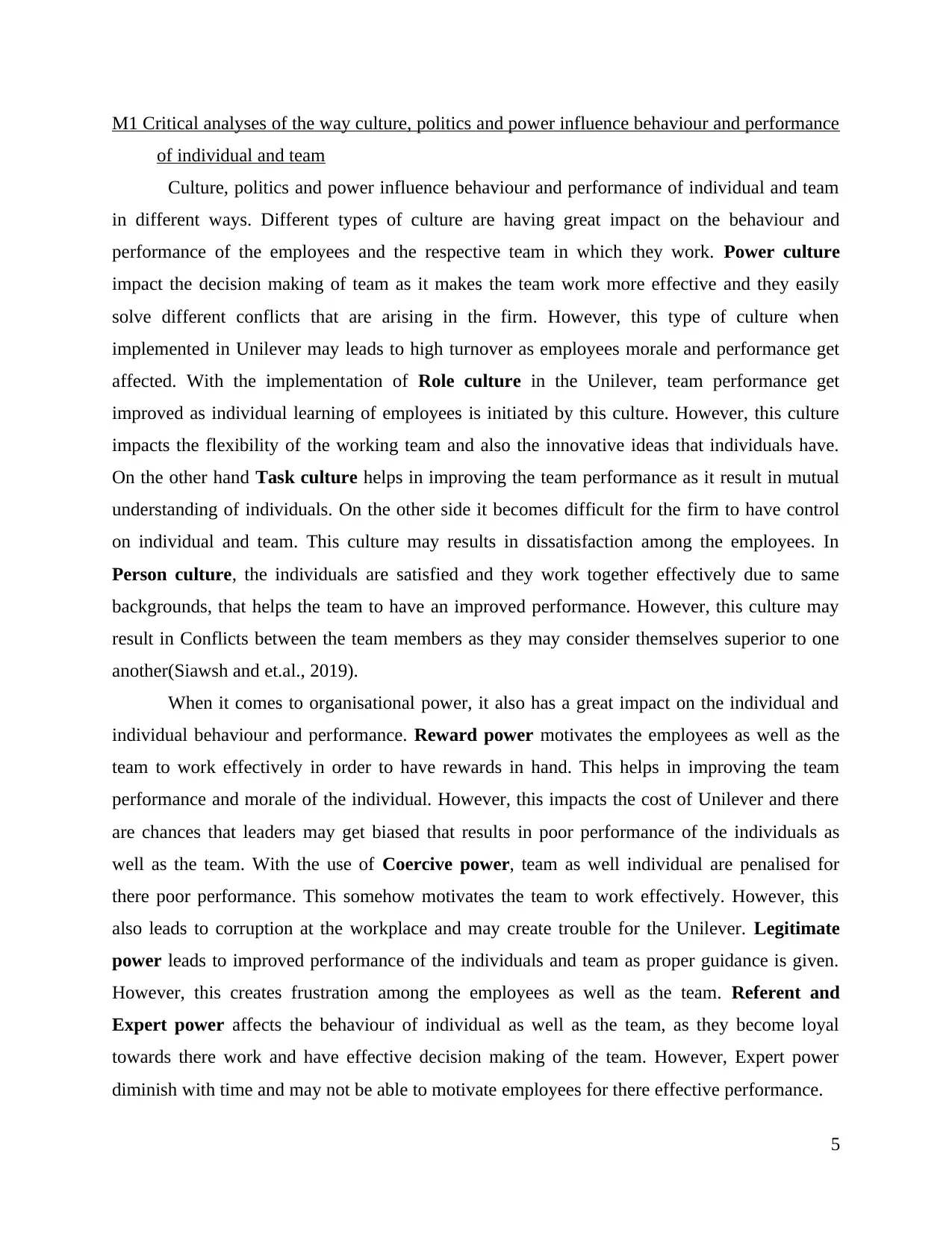
M1 Critical analyses of the way culture, politics and power influence behaviour and performance
of individual and team
Culture, politics and power influence behaviour and performance of individual and team
in different ways. Different types of culture are having great impact on the behaviour and
performance of the employees and the respective team in which they work. Power culture
impact the decision making of team as it makes the team work more effective and they easily
solve different conflicts that are arising in the firm. However, this type of culture when
implemented in Unilever may leads to high turnover as employees morale and performance get
affected. With the implementation of Role culture in the Unilever, team performance get
improved as individual learning of employees is initiated by this culture. However, this culture
impacts the flexibility of the working team and also the innovative ideas that individuals have.
On the other hand Task culture helps in improving the team performance as it result in mutual
understanding of individuals. On the other side it becomes difficult for the firm to have control
on individual and team. This culture may results in dissatisfaction among the employees. In
Person culture, the individuals are satisfied and they work together effectively due to same
backgrounds, that helps the team to have an improved performance. However, this culture may
result in Conflicts between the team members as they may consider themselves superior to one
another(Siawsh and et.al., 2019).
When it comes to organisational power, it also has a great impact on the individual and
individual behaviour and performance. Reward power motivates the employees as well as the
team to work effectively in order to have rewards in hand. This helps in improving the team
performance and morale of the individual. However, this impacts the cost of Unilever and there
are chances that leaders may get biased that results in poor performance of the individuals as
well as the team. With the use of Coercive power, team as well individual are penalised for
there poor performance. This somehow motivates the team to work effectively. However, this
also leads to corruption at the workplace and may create trouble for the Unilever. Legitimate
power leads to improved performance of the individuals and team as proper guidance is given.
However, this creates frustration among the employees as well as the team. Referent and
Expert power affects the behaviour of individual as well as the team, as they become loyal
towards there work and have effective decision making of the team. However, Expert power
diminish with time and may not be able to motivate employees for there effective performance.
5
of individual and team
Culture, politics and power influence behaviour and performance of individual and team
in different ways. Different types of culture are having great impact on the behaviour and
performance of the employees and the respective team in which they work. Power culture
impact the decision making of team as it makes the team work more effective and they easily
solve different conflicts that are arising in the firm. However, this type of culture when
implemented in Unilever may leads to high turnover as employees morale and performance get
affected. With the implementation of Role culture in the Unilever, team performance get
improved as individual learning of employees is initiated by this culture. However, this culture
impacts the flexibility of the working team and also the innovative ideas that individuals have.
On the other hand Task culture helps in improving the team performance as it result in mutual
understanding of individuals. On the other side it becomes difficult for the firm to have control
on individual and team. This culture may results in dissatisfaction among the employees. In
Person culture, the individuals are satisfied and they work together effectively due to same
backgrounds, that helps the team to have an improved performance. However, this culture may
result in Conflicts between the team members as they may consider themselves superior to one
another(Siawsh and et.al., 2019).
When it comes to organisational power, it also has a great impact on the individual and
individual behaviour and performance. Reward power motivates the employees as well as the
team to work effectively in order to have rewards in hand. This helps in improving the team
performance and morale of the individual. However, this impacts the cost of Unilever and there
are chances that leaders may get biased that results in poor performance of the individuals as
well as the team. With the use of Coercive power, team as well individual are penalised for
there poor performance. This somehow motivates the team to work effectively. However, this
also leads to corruption at the workplace and may create trouble for the Unilever. Legitimate
power leads to improved performance of the individuals and team as proper guidance is given.
However, this creates frustration among the employees as well as the team. Referent and
Expert power affects the behaviour of individual as well as the team, as they become loyal
towards there work and have effective decision making of the team. However, Expert power
diminish with time and may not be able to motivate employees for there effective performance.
5
Paraphrase This Document
Need a fresh take? Get an instant paraphrase of this document with our AI Paraphraser
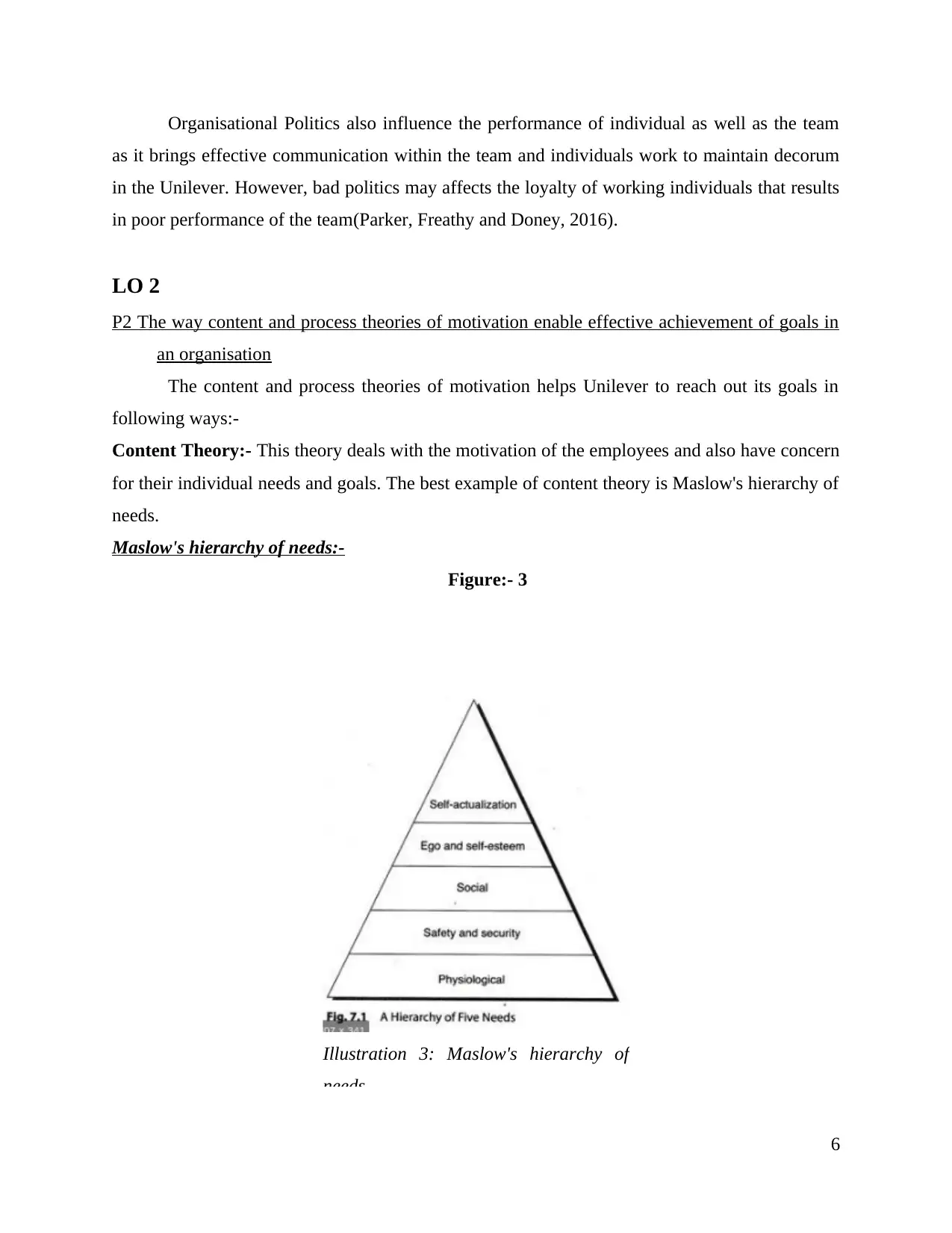
Organisational Politics also influence the performance of individual as well as the team
as it brings effective communication within the team and individuals work to maintain decorum
in the Unilever. However, bad politics may affects the loyalty of working individuals that results
in poor performance of the team(Parker, Freathy and Doney, 2016).
LO 2
P2 The way content and process theories of motivation enable effective achievement of goals in
an organisation
The content and process theories of motivation helps Unilever to reach out its goals in
following ways:-
Content Theory:- This theory deals with the motivation of the employees and also have concern
for their individual needs and goals. The best example of content theory is Maslow's hierarchy of
needs.
Maslow's hierarchy of needs:-
Figure:- 3
6
Illustration 3: Maslow's hierarchy of
needs
as it brings effective communication within the team and individuals work to maintain decorum
in the Unilever. However, bad politics may affects the loyalty of working individuals that results
in poor performance of the team(Parker, Freathy and Doney, 2016).
LO 2
P2 The way content and process theories of motivation enable effective achievement of goals in
an organisation
The content and process theories of motivation helps Unilever to reach out its goals in
following ways:-
Content Theory:- This theory deals with the motivation of the employees and also have concern
for their individual needs and goals. The best example of content theory is Maslow's hierarchy of
needs.
Maslow's hierarchy of needs:-
Figure:- 3
6
Illustration 3: Maslow's hierarchy of
needs
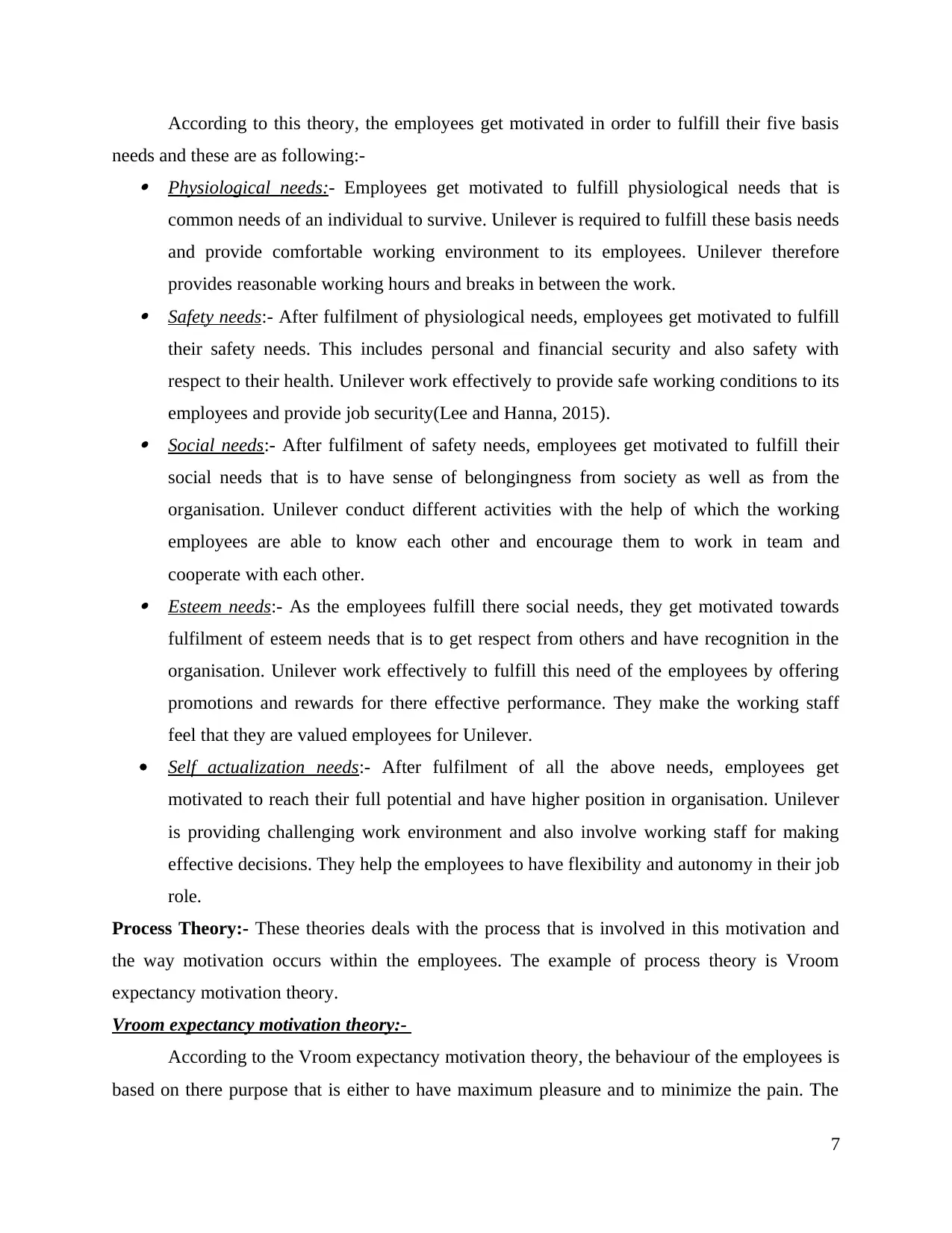
According to this theory, the employees get motivated in order to fulfill their five basis
needs and these are as following:- Physiological needs:- Employees get motivated to fulfill physiological needs that is
common needs of an individual to survive. Unilever is required to fulfill these basis needs
and provide comfortable working environment to its employees. Unilever therefore
provides reasonable working hours and breaks in between the work. Safety needs:- After fulfilment of physiological needs, employees get motivated to fulfill
their safety needs. This includes personal and financial security and also safety with
respect to their health. Unilever work effectively to provide safe working conditions to its
employees and provide job security(Lee and Hanna, 2015). Social needs:- After fulfilment of safety needs, employees get motivated to fulfill their
social needs that is to have sense of belongingness from society as well as from the
organisation. Unilever conduct different activities with the help of which the working
employees are able to know each other and encourage them to work in team and
cooperate with each other. Esteem needs:- As the employees fulfill there social needs, they get motivated towards
fulfilment of esteem needs that is to get respect from others and have recognition in the
organisation. Unilever work effectively to fulfill this need of the employees by offering
promotions and rewards for there effective performance. They make the working staff
feel that they are valued employees for Unilever.
Self actualization needs:- After fulfilment of all the above needs, employees get
motivated to reach their full potential and have higher position in organisation. Unilever
is providing challenging work environment and also involve working staff for making
effective decisions. They help the employees to have flexibility and autonomy in their job
role.
Process Theory:- These theories deals with the process that is involved in this motivation and
the way motivation occurs within the employees. The example of process theory is Vroom
expectancy motivation theory.
Vroom expectancy motivation theory:-
According to the Vroom expectancy motivation theory, the behaviour of the employees is
based on there purpose that is either to have maximum pleasure and to minimize the pain. The
7
needs and these are as following:- Physiological needs:- Employees get motivated to fulfill physiological needs that is
common needs of an individual to survive. Unilever is required to fulfill these basis needs
and provide comfortable working environment to its employees. Unilever therefore
provides reasonable working hours and breaks in between the work. Safety needs:- After fulfilment of physiological needs, employees get motivated to fulfill
their safety needs. This includes personal and financial security and also safety with
respect to their health. Unilever work effectively to provide safe working conditions to its
employees and provide job security(Lee and Hanna, 2015). Social needs:- After fulfilment of safety needs, employees get motivated to fulfill their
social needs that is to have sense of belongingness from society as well as from the
organisation. Unilever conduct different activities with the help of which the working
employees are able to know each other and encourage them to work in team and
cooperate with each other. Esteem needs:- As the employees fulfill there social needs, they get motivated towards
fulfilment of esteem needs that is to get respect from others and have recognition in the
organisation. Unilever work effectively to fulfill this need of the employees by offering
promotions and rewards for there effective performance. They make the working staff
feel that they are valued employees for Unilever.
Self actualization needs:- After fulfilment of all the above needs, employees get
motivated to reach their full potential and have higher position in organisation. Unilever
is providing challenging work environment and also involve working staff for making
effective decisions. They help the employees to have flexibility and autonomy in their job
role.
Process Theory:- These theories deals with the process that is involved in this motivation and
the way motivation occurs within the employees. The example of process theory is Vroom
expectancy motivation theory.
Vroom expectancy motivation theory:-
According to the Vroom expectancy motivation theory, the behaviour of the employees is
based on there purpose that is either to have maximum pleasure and to minimize the pain. The
7
⊘ This is a preview!⊘
Do you want full access?
Subscribe today to unlock all pages.

Trusted by 1+ million students worldwide
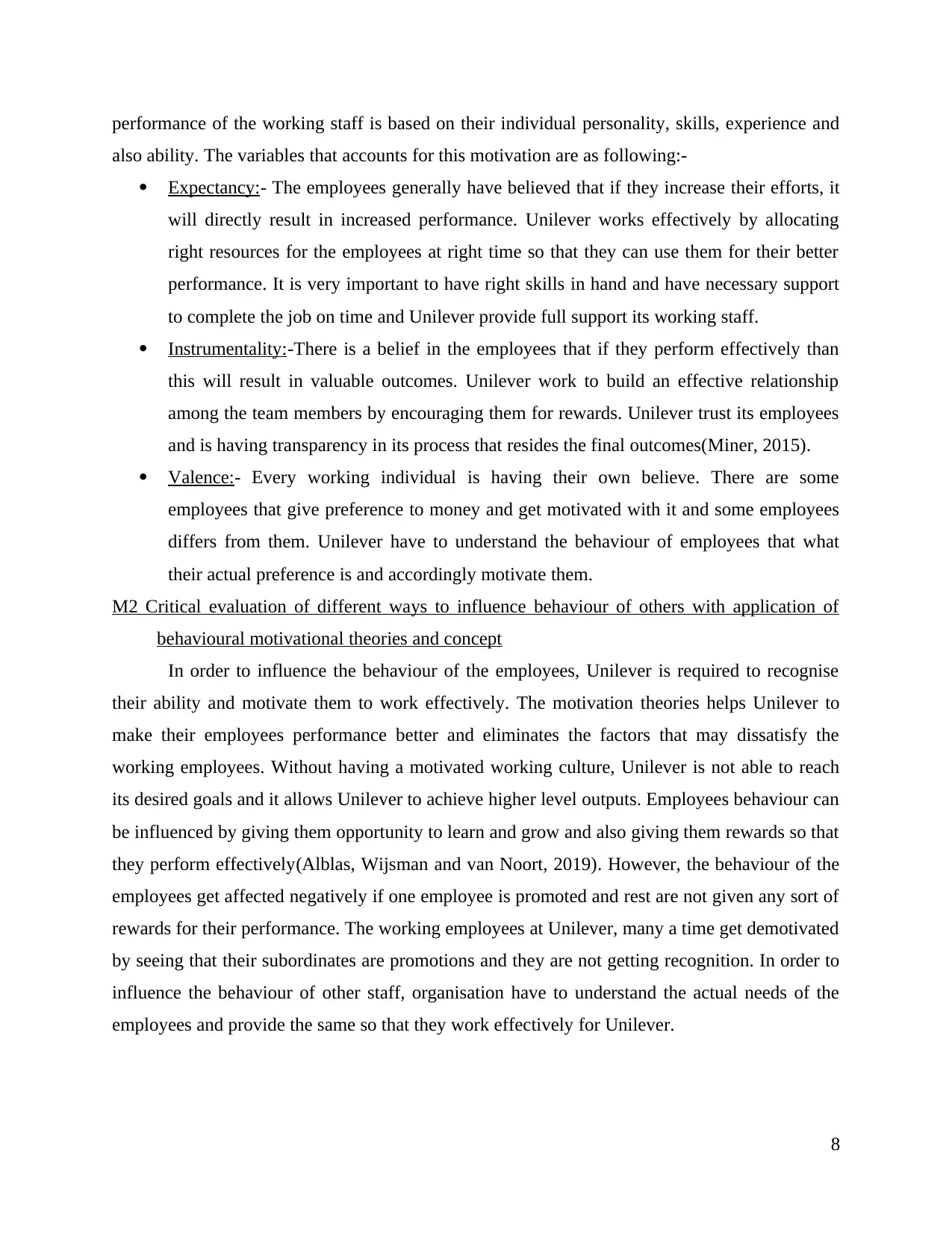
performance of the working staff is based on their individual personality, skills, experience and
also ability. The variables that accounts for this motivation are as following:-
Expectancy:- The employees generally have believed that if they increase their efforts, it
will directly result in increased performance. Unilever works effectively by allocating
right resources for the employees at right time so that they can use them for their better
performance. It is very important to have right skills in hand and have necessary support
to complete the job on time and Unilever provide full support its working staff.
Instrumentality:-There is a belief in the employees that if they perform effectively than
this will result in valuable outcomes. Unilever work to build an effective relationship
among the team members by encouraging them for rewards. Unilever trust its employees
and is having transparency in its process that resides the final outcomes(Miner, 2015).
Valence:- Every working individual is having their own believe. There are some
employees that give preference to money and get motivated with it and some employees
differs from them. Unilever have to understand the behaviour of employees that what
their actual preference is and accordingly motivate them.
M2 Critical evaluation of different ways to influence behaviour of others with application of
behavioural motivational theories and concept
In order to influence the behaviour of the employees, Unilever is required to recognise
their ability and motivate them to work effectively. The motivation theories helps Unilever to
make their employees performance better and eliminates the factors that may dissatisfy the
working employees. Without having a motivated working culture, Unilever is not able to reach
its desired goals and it allows Unilever to achieve higher level outputs. Employees behaviour can
be influenced by giving them opportunity to learn and grow and also giving them rewards so that
they perform effectively(Alblas, Wijsman and van Noort, 2019). However, the behaviour of the
employees get affected negatively if one employee is promoted and rest are not given any sort of
rewards for their performance. The working employees at Unilever, many a time get demotivated
by seeing that their subordinates are promotions and they are not getting recognition. In order to
influence the behaviour of other staff, organisation have to understand the actual needs of the
employees and provide the same so that they work effectively for Unilever.
8
also ability. The variables that accounts for this motivation are as following:-
Expectancy:- The employees generally have believed that if they increase their efforts, it
will directly result in increased performance. Unilever works effectively by allocating
right resources for the employees at right time so that they can use them for their better
performance. It is very important to have right skills in hand and have necessary support
to complete the job on time and Unilever provide full support its working staff.
Instrumentality:-There is a belief in the employees that if they perform effectively than
this will result in valuable outcomes. Unilever work to build an effective relationship
among the team members by encouraging them for rewards. Unilever trust its employees
and is having transparency in its process that resides the final outcomes(Miner, 2015).
Valence:- Every working individual is having their own believe. There are some
employees that give preference to money and get motivated with it and some employees
differs from them. Unilever have to understand the behaviour of employees that what
their actual preference is and accordingly motivate them.
M2 Critical evaluation of different ways to influence behaviour of others with application of
behavioural motivational theories and concept
In order to influence the behaviour of the employees, Unilever is required to recognise
their ability and motivate them to work effectively. The motivation theories helps Unilever to
make their employees performance better and eliminates the factors that may dissatisfy the
working employees. Without having a motivated working culture, Unilever is not able to reach
its desired goals and it allows Unilever to achieve higher level outputs. Employees behaviour can
be influenced by giving them opportunity to learn and grow and also giving them rewards so that
they perform effectively(Alblas, Wijsman and van Noort, 2019). However, the behaviour of the
employees get affected negatively if one employee is promoted and rest are not given any sort of
rewards for their performance. The working employees at Unilever, many a time get demotivated
by seeing that their subordinates are promotions and they are not getting recognition. In order to
influence the behaviour of other staff, organisation have to understand the actual needs of the
employees and provide the same so that they work effectively for Unilever.
8
Paraphrase This Document
Need a fresh take? Get an instant paraphrase of this document with our AI Paraphraser
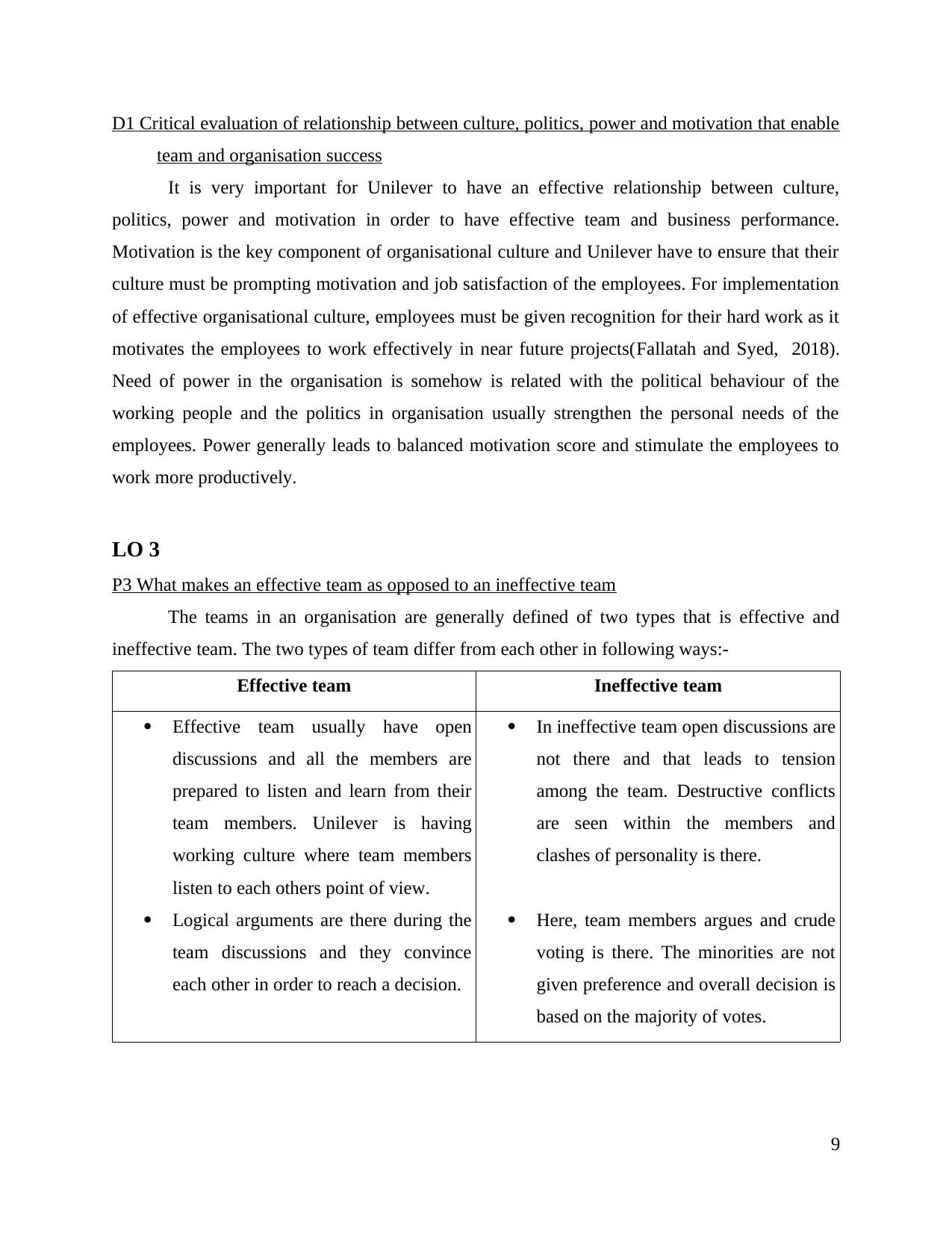
D1 Critical evaluation of relationship between culture, politics, power and motivation that enable
team and organisation success
It is very important for Unilever to have an effective relationship between culture,
politics, power and motivation in order to have effective team and business performance.
Motivation is the key component of organisational culture and Unilever have to ensure that their
culture must be prompting motivation and job satisfaction of the employees. For implementation
of effective organisational culture, employees must be given recognition for their hard work as it
motivates the employees to work effectively in near future projects(Fallatah and Syed, 2018).
Need of power in the organisation is somehow is related with the political behaviour of the
working people and the politics in organisation usually strengthen the personal needs of the
employees. Power generally leads to balanced motivation score and stimulate the employees to
work more productively.
LO 3
P3 What makes an effective team as opposed to an ineffective team
The teams in an organisation are generally defined of two types that is effective and
ineffective team. The two types of team differ from each other in following ways:-
Effective team Ineffective team
Effective team usually have open
discussions and all the members are
prepared to listen and learn from their
team members. Unilever is having
working culture where team members
listen to each others point of view.
Logical arguments are there during the
team discussions and they convince
each other in order to reach a decision.
In ineffective team open discussions are
not there and that leads to tension
among the team. Destructive conflicts
are seen within the members and
clashes of personality is there.
Here, team members argues and crude
voting is there. The minorities are not
given preference and overall decision is
based on the majority of votes.
9
team and organisation success
It is very important for Unilever to have an effective relationship between culture,
politics, power and motivation in order to have effective team and business performance.
Motivation is the key component of organisational culture and Unilever have to ensure that their
culture must be prompting motivation and job satisfaction of the employees. For implementation
of effective organisational culture, employees must be given recognition for their hard work as it
motivates the employees to work effectively in near future projects(Fallatah and Syed, 2018).
Need of power in the organisation is somehow is related with the political behaviour of the
working people and the politics in organisation usually strengthen the personal needs of the
employees. Power generally leads to balanced motivation score and stimulate the employees to
work more productively.
LO 3
P3 What makes an effective team as opposed to an ineffective team
The teams in an organisation are generally defined of two types that is effective and
ineffective team. The two types of team differ from each other in following ways:-
Effective team Ineffective team
Effective team usually have open
discussions and all the members are
prepared to listen and learn from their
team members. Unilever is having
working culture where team members
listen to each others point of view.
Logical arguments are there during the
team discussions and they convince
each other in order to reach a decision.
In ineffective team open discussions are
not there and that leads to tension
among the team. Destructive conflicts
are seen within the members and
clashes of personality is there.
Here, team members argues and crude
voting is there. The minorities are not
given preference and overall decision is
based on the majority of votes.
9
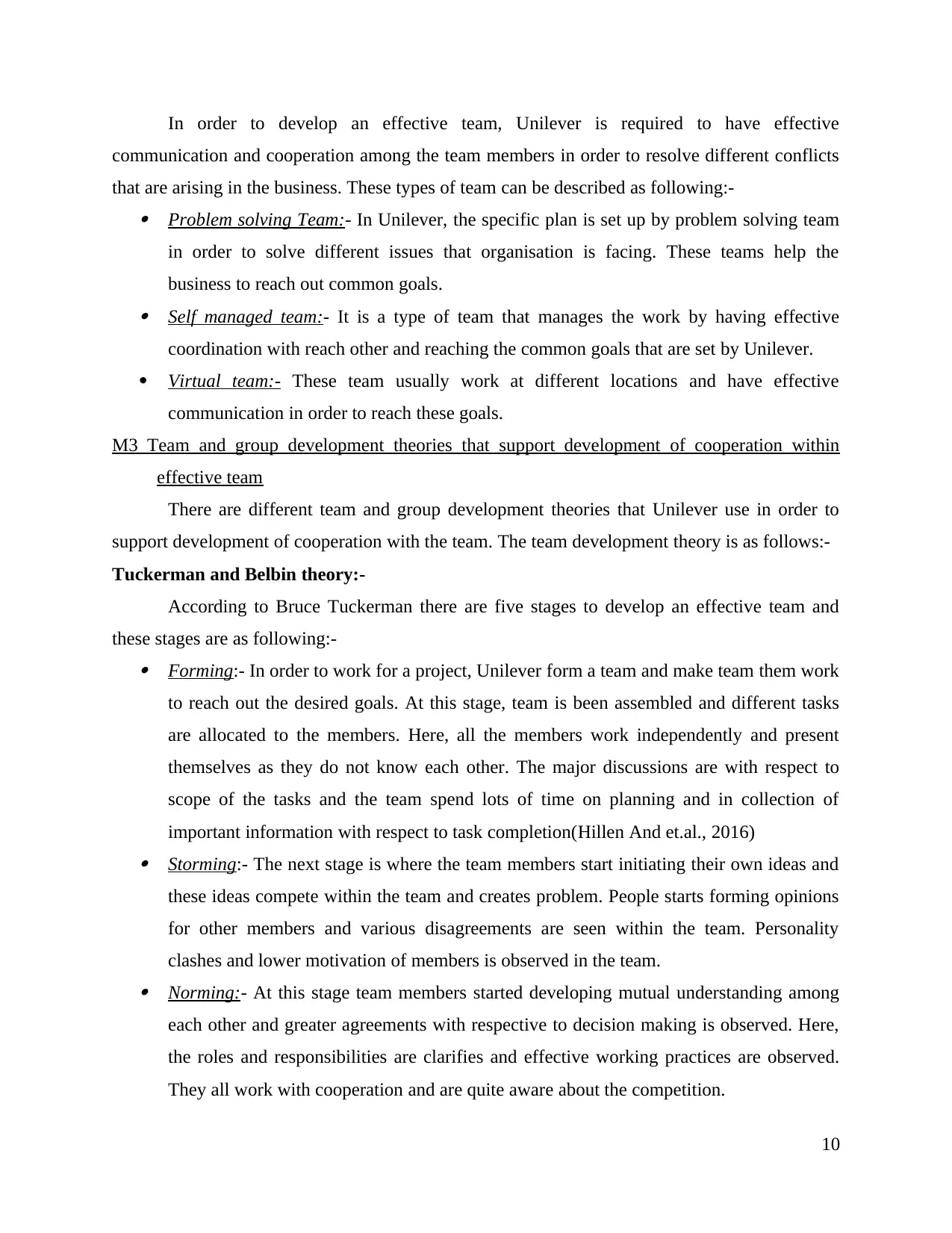
In order to develop an effective team, Unilever is required to have effective
communication and cooperation among the team members in order to resolve different conflicts
that are arising in the business. These types of team can be described as following:- Problem solving Team:- In Unilever, the specific plan is set up by problem solving team
in order to solve different issues that organisation is facing. These teams help the
business to reach out common goals. Self managed team:- It is a type of team that manages the work by having effective
coordination with reach other and reaching the common goals that are set by Unilever.
Virtual team:- These team usually work at different locations and have effective
communication in order to reach these goals.
M3 Team and group development theories that support development of cooperation within
effective team
There are different team and group development theories that Unilever use in order to
support development of cooperation with the team. The team development theory is as follows:-
Tuckerman and Belbin theory:-
According to Bruce Tuckerman there are five stages to develop an effective team and
these stages are as following:- Forming:- In order to work for a project, Unilever form a team and make team them work
to reach out the desired goals. At this stage, team is been assembled and different tasks
are allocated to the members. Here, all the members work independently and present
themselves as they do not know each other. The major discussions are with respect to
scope of the tasks and the team spend lots of time on planning and in collection of
important information with respect to task completion(Hillen And et.al., 2016) Storming:- The next stage is where the team members start initiating their own ideas and
these ideas compete within the team and creates problem. People starts forming opinions
for other members and various disagreements are seen within the team. Personality
clashes and lower motivation of members is observed in the team. Norming:- At this stage team members started developing mutual understanding among
each other and greater agreements with respective to decision making is observed. Here,
the roles and responsibilities are clarifies and effective working practices are observed.
They all work with cooperation and are quite aware about the competition.
10
communication and cooperation among the team members in order to resolve different conflicts
that are arising in the business. These types of team can be described as following:- Problem solving Team:- In Unilever, the specific plan is set up by problem solving team
in order to solve different issues that organisation is facing. These teams help the
business to reach out common goals. Self managed team:- It is a type of team that manages the work by having effective
coordination with reach other and reaching the common goals that are set by Unilever.
Virtual team:- These team usually work at different locations and have effective
communication in order to reach these goals.
M3 Team and group development theories that support development of cooperation within
effective team
There are different team and group development theories that Unilever use in order to
support development of cooperation with the team. The team development theory is as follows:-
Tuckerman and Belbin theory:-
According to Bruce Tuckerman there are five stages to develop an effective team and
these stages are as following:- Forming:- In order to work for a project, Unilever form a team and make team them work
to reach out the desired goals. At this stage, team is been assembled and different tasks
are allocated to the members. Here, all the members work independently and present
themselves as they do not know each other. The major discussions are with respect to
scope of the tasks and the team spend lots of time on planning and in collection of
important information with respect to task completion(Hillen And et.al., 2016) Storming:- The next stage is where the team members start initiating their own ideas and
these ideas compete within the team and creates problem. People starts forming opinions
for other members and various disagreements are seen within the team. Personality
clashes and lower motivation of members is observed in the team. Norming:- At this stage team members started developing mutual understanding among
each other and greater agreements with respective to decision making is observed. Here,
the roles and responsibilities are clarifies and effective working practices are observed.
They all work with cooperation and are quite aware about the competition.
10
⊘ This is a preview!⊘
Do you want full access?
Subscribe today to unlock all pages.

Trusted by 1+ million students worldwide
1 out of 16
Related Documents
Your All-in-One AI-Powered Toolkit for Academic Success.
+13062052269
info@desklib.com
Available 24*7 on WhatsApp / Email
![[object Object]](/_next/static/media/star-bottom.7253800d.svg)
Unlock your academic potential
Copyright © 2020–2026 A2Z Services. All Rights Reserved. Developed and managed by ZUCOL.





